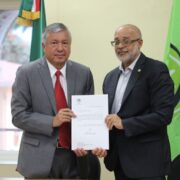Bounty Killer Says Afrobeats Not In Competition With Dancehall
Black Immigrant Daily News
Bounty Killer has declared that he fully embraces Afrobeats music, and says the genre should not be pitted against Dancehall.
In responding to the question whether “Dancehall music still has a place on the international market with the emergence of Afrobeats,” during an I Never Knew TV interview, Bounty said that the two genres should be left to co-exist harmoniously and not be constantly compared or seen as one replacing the other.
“Afrobeat has nothing to do with Dancehall. Afrobeat is another genre. Afrobeat never came in competition with Dancehall or came with intent to take something from Dancehall. I don’t know why people keep on comparing Afrobeat and Dancehall. Why? Afrobeat is like a baby from Dancehall; it’s a relative,” Bounty stated.
“Afrobeat and Jamaican music is similar music. Africa and Jamaican music and I’m so happy so happy for Afrobeat. Music originate in Africa from the Congo beat. Africa finally have a sound, so I’m excited and Afrobeats not taking nothing from Dancehall. Afrobeats complements Dancehall. Si Nicki Minaj and Skeng deh all ova pon Dancehall beats,” he added.
Since March last year, many comparisons have been made between Dancehall and Afrobeats, especially after Billboard joined forces with music festival and global Afrobeats brand Afro Nation, to launch the first-ever US chart for Afrobeats Songs. The move by Billboard had come two years after it discontinued its Reggae Digital Song Sales chart, which ranked the top-downloaded Reggae and Dancehall songs in the US.
In January this year, Opposition leader and President of the People’s National Party (PNP) Mark Golding, had expressed concern that the “heydays of Jamaica’s music industry had passed and “Afrobeats has kinda gone into that area and is eating our food.”
However, that same month, Reggae/Dancehall singer Tanya Stephens had dismissed comments made by her compatriot, Dancehall deejay Mr. Lexx who, in expressing discontent with the state of the music, had said that Dancehall music was lagging behind Afrobeats, because the majority of new songs being released are about violence, lewdness, and lotto scamming.
Stephens had come to the music’s defense, pointing out the duplicity in Lexx’s statements, while arguing that artists from as far back as the 1980s, and from his own generation, had never predicated their music on ‘feeling good’, but that sex and violence have always been a part of Jamaican music, as the island’s artists have never operated like a monolithic group.
She had also argued that the reason the Jamaican music was not seeing strong sales, was due to the island’s people not buying their music, unlike African audiences who are more supportive of Afrobeats, which leads to better quality shows and better positioning for singers from the African genre.
The Rebelution artist had also posited that once a Dancehall song is good, it will be successful. She had also said it was duplicitous to suggest that all music from the 1990s era was of a superior standard, as many were regarded as subpar.
In January this year, Anointed singer Bugle too, had declared that there should be no comparison between sales of Dancehall songs and Afrobeats, as the African genre has a continental marketplace of hundreds of millions of people, in comparison to Jamaica’s three million.
Bugle had argued that once an Afrobeats artiste releases a song, it will, more likely than not, instantly hit the Billboard charts and sell “diamond and gold” due to the sheer number of people who subscribe to Afrobeat music.
In November last year, following the release of the International Federation of the Phonographic Industry’s (IFPI) Engaging with Music 2022 study, in which reggae was ranked number 10 out of more than 5,000 genres, University of the West Indies Professor Donna P. Hope, had said Afrobeats’ absence from the coveted top 10, was a significant point to note.
“While we are being told that Afrobeats is pushing Dancehall out of the way, it did not make it on that list… It (Afrobeats) is a new enough genre; it will take some time for it to get to that level of recognition globally that Jamaican music, Reggae and Dancehall for example, have garnered over many years since the development of our music industry,” Professor Hope, Professor Hope, who is a lecturer in Culture, Gender, and Society, had explained.
Follow us for daily Dancehall news on Facebook, Twitter and Google News.
NewsAmericasNow.com










